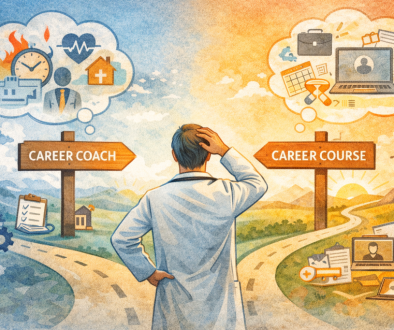What Every New Attending Physician Needs to Know
You are a new attending physician! Congratulations! You made it through one of the most transformative education and professional training experiences that exists. Are you ready for what comes next?
Medical training is like running a marathon. Equal parts grueling, consuming, relentless, and rewarding. Every step forward often comes at a personal cost. As a student, you watch your non-medical peers build lives, start families, buy homes, and climb career ladders, while you remain buried in textbooks and debt. You work 80-hour weeks through residency, missing birthdays, vacations, and rest. You postpone starting a family, saving for retirement, and even feeling like an adult. All of this, you tell yourself, will pay off someday. When you become an attending, it will all be worth it.
But what happens when that day finally arrives, and you still feel exhausted, disconnected, and uncertain?
When the Dream Job Doesn’t Feel Like a Dream
For years, you told yourself: “Once I’m done with training, everything will settle down.” You envisioned more freedom, less bureaucracy, and perhaps time to reconnect with who you are outside of scrubs. But instead of relief, many new attending physicians face a new kind of pressure that’s harder to name.
You now carry full accountability. You’re no longer a trainee. You’re the final word. The emotional weight of every decision falls squarely on your shoulders. Work may technically be “easier” in some ways, but it is rarely less stressful. The illusion of work-life balance starts to crack as administrative demands, and RVU targets become the new goal posts.
The Hidden Cost Burnout as a New Attending Physician
Physician burnout isn’t just about long hours or complex patients. It is often more subtle. As a new attending physician, you may make split-second decisions with lasting consequences, deliver bad news, navigate broken systems, or watch patients suffer due to socioeconomic factors outside your control. Meanwhile, you’re expected to remain calm, efficient, and, most dangerously, impervious to it all.
This unacknowledged grief and emotional dissonance take a toll. You might feel isolated from peers who left medicine or chose lighter specialties. You might look successful from the outside, yet feel emptier each day.
These emotions aren’t evidence of weakness. They’re signals that something deeper is asking to be acknowledged.
The System Isn’t Broken—It Was Built This Way
As a new attending physician, you may quietly wonder: “Is it me? Am I just not cut out for this?” But the problem is not personal. Our current healthcare system demands self-sacrifice, perfection, and productivity, while offering little emotional or spiritual support in return.
This leads many to wonder if clinical medicine is for them. Some every start doom scrolling the internet for a way out. They begin to wonder if career change is possible for doctors. They search nonclinical careers for doctors or how to reclaim their joy without leaving medicine entirely. But few know where to begin.
Real-Life Pivot: My Story
From the outside, it looked like I was thriving. I was no longer a new attending physician. I thought I navigated that phase of my career unscathed. I had paid off my loans, and my partner and I built a new home. I was the fellowship program director and up for promotion to full professor. But inside, I was falling apart. I dreaded work, withdrew from friends, and questioned whether I had made a massive mistake in becoming a doctor.
One day, after a particularly tough situation with a patient, several fellows came to me in tears, upset about what had happened. To help them, I organized a COPE session with our internal team, which is designed to support providers who are having a hard time. During the session, one of the facilitators mentioned that it’s normal to feel stressed, tired, or even unhappy with your job for short periods, especially after difficult situations. However, if these feelings last for weeks or months, it’s not normal, and it’s essential to seek help. That comment resonated with me. I realized it had been a long time since I felt happy or enjoyed going to work.
So, with reluctance, I sought help and found a coach. Gradually, things started to improve. To my surprise, I found a gateway to improve my job and return to myself. With support, I learned values-based decision-making, developed emotional intelligence, and eventually transitioned into a role in medical education, tweaked my clinical duties, and started my own coaching business. My story is not unique.
What Physician Coaching Can Do
Physician coaching is not about fixing you but helping you return to yourself. Unlike therapy, coaching focuses on what you want to create going forward. It provides structure, insight, and support to make aligned decisions.
Physician-specific coaching—like the kind offered at The Developing Doctor—understands the unique challenges of clinical life. Whether you’re experiencing moral injury, overwhelm, or simply wondering what else might be possible, coaching can help you:
- Clarify personal values and long-term goals
- Explore alternative or nonclinical careersalternative or nonclinical careers
- Rebuild your sense of identity outside of your white coat
- Reconnect with meaning, purpose, and passion
Using tools like DISC communication styles, the VIA StrengthsFinder, and emotional intelligence assessments, coaching provides a roadmap for the next phase of your career—whether that means staying, pivoting, or evolving within the field.
So… What Comes Next?
If you’re a new attending who feels more lost than liberated, here’s a gentle truth: it’s okay to question. It’s healthy. The dissonance you feel isn’t proof that you’re on the wrong path—it’s proof that you’re awake to your needs.
This may be the moment to reevaluate, to ask what you want your life and career to stand for, and to explore the paths you were too busy or scared to consider during training. Thousands of physicians have made changes—small and large—that have allowed them to reclaim joy, autonomy, and purpose.
You’re not alone. And you don’t have to figure it out alone either.
You Are Not Alone—And You’re Not Trapped
Thousands of physicians are beginning to realize that the old story—sacrifice now for happiness later—no longer works. They’re choosing to write new stories. Some stay in clinical practice but change how and where they work. Others shift to teaching, tech, public health, or wellness roles. Some even build entrepreneurial paths that blend their skills with personal passions.
But the first step is permission—the permission to ask better questions and to reach for support.
If you’re ready to take that step, The Developing Doctor is here to walk with you. Through physician-specific coaching and resources, we help early- and mid-career doctors rediscover their clarity, agency, and joy.
Your next chapter starts when you decide to write it.





